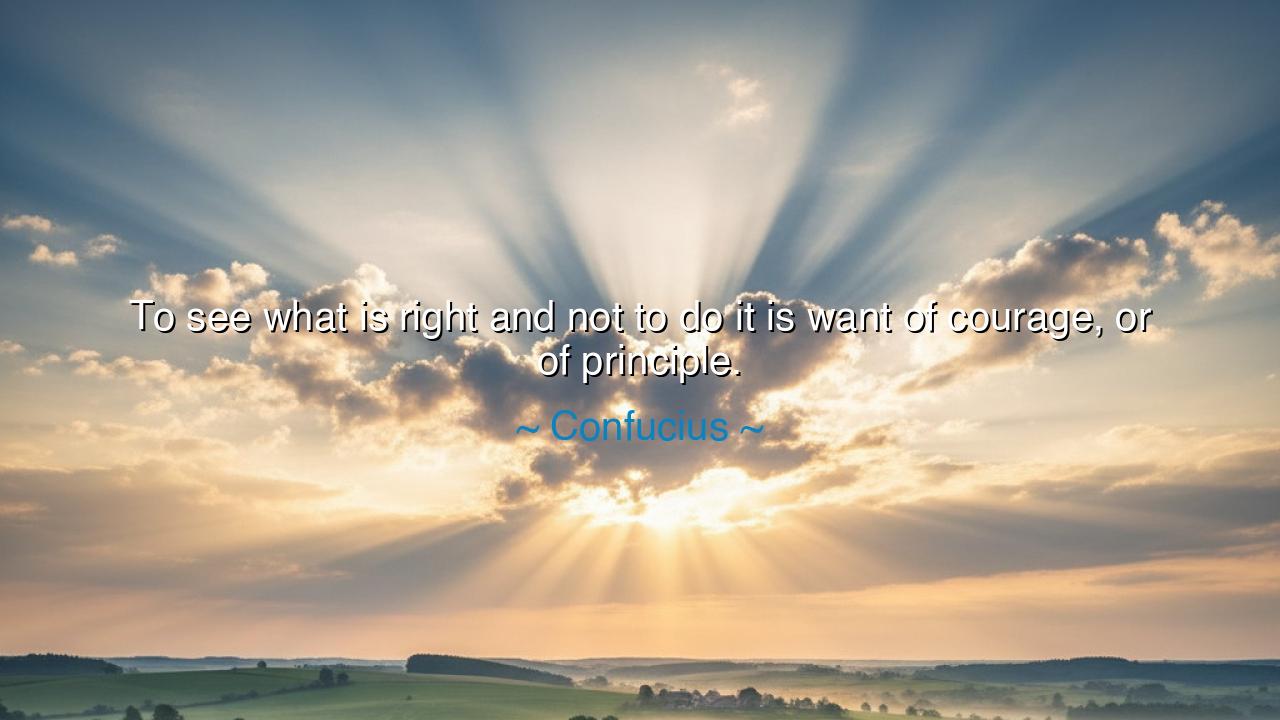
To see what is right and not to do it is want of courage, or of






In the sacred wisdom of the East, the teacher Confucius once declared: “To see what is right and not to do it is want of courage, or of principle.” These words, though uttered over two thousand years ago, remain a living mirror for the human soul. For they reveal one of the deepest truths of existence — that knowing what is right is not enough; one must also possess the courage and integrity to act upon it. Knowledge without action is like light unseen, and virtue unpracticed is no virtue at all.
Confucius, the sage of ancient China, lived during an age of disorder — a time when kingdoms warred, rulers schemed, and the moral fabric of society frayed like an old garment. In the midst of chaos, he sought not conquest but harmony, not power but righteousness. His teachings, preserved in the Analects, remind us that the essence of morality lies not in grand speeches or rituals, but in the quiet, steadfast alignment between thought, word, and deed. When he said, “To see what is right and not to do it,” he was speaking to the weakness that dwells in every human heart — the fear of standing alone, the temptation to remain silent when truth demands a voice.
This saying pierces deeply because it separates mere understanding from moral strength. To know right from wrong is a matter of the mind; to act rightly, even when it costs us, is the mark of the heart. Courage is the bridge between knowing and doing, between vision and virtue. Without courage, knowledge is inert — it sleeps within us, never awakening into action. And without principle, courage itself becomes wild, unanchored, and dangerous. The one who possesses both — courage to act and principle to guide — stands as a pillar amid the storm, a light against the gathering dark.
Consider the story of Socrates, the philosopher of Athens, who like Confucius, placed truth above comfort. When accused falsely and brought before the court, he could have chosen safety by denying his beliefs. Yet he refused. He saw what was right — to remain faithful to his conscience — and he did it, though it led him to drink the cup of poison. His courage was not born of pride, but of principle. He knew that to betray the truth would be to betray the self. Thus, his death became a lesson for all ages: that integrity is worth more than life itself, for life without integrity is a hollow shadow.
Confucius would have seen in Socrates a kindred spirit, for both men taught that virtue demands action. It is easy to condemn injustice from afar, but harder to stand against it when it threatens your comfort or safety. The world is filled with those who see wrong yet remain silent — who know compassion yet choose indifference, who perceive deceit yet tolerate it. This, the Master calls “want of courage,” for fear holds them bound. And if fear is not the reason, then it is “want of principle,” for some hearts are too easily swayed by convenience or gain. Thus, Confucius warns us: knowledge alone does not make us good; only the union of conscience and action does.
The ancients believed that the measure of a person lies not in what they know, but in what they do when tested. The righteous man acts rightly even when none are watching. The just woman speaks truth even when her voice trembles. The true leader does what is right not for reward, but because it is right. To live by such principles requires both the steadfastness of the mountain and the humility of the river — unyielding in integrity, yet gentle in spirit.
Let this be the teaching for all who hear: Do not turn away from what is right. When your conscience speaks, listen. When your heart knows the path, walk it, even if it is steep. Each moment of courage strengthens the soul; each act of integrity builds the foundation of a noble life. Do not wait for the crowd to move — for truth seldom travels with the multitude. Be the one who acts, even when others hesitate, for in doing so you honor both your courage and your principle.
And so, as Confucius taught, remember this eternal law: to see the good and fail to pursue it is to betray your own nature. Courage and principle are the twin wings of righteousness — without one, the other cannot rise. Nurture both daily in your thoughts, your choices, your deeds. For when your courage flows from your principles, your life becomes not just good, but great — a living testament that wisdom is not found in words alone, but in the actions that bring truth to life.






AAdministratorAdministrator
Welcome, honored guests. Please leave a comment, we will respond soon